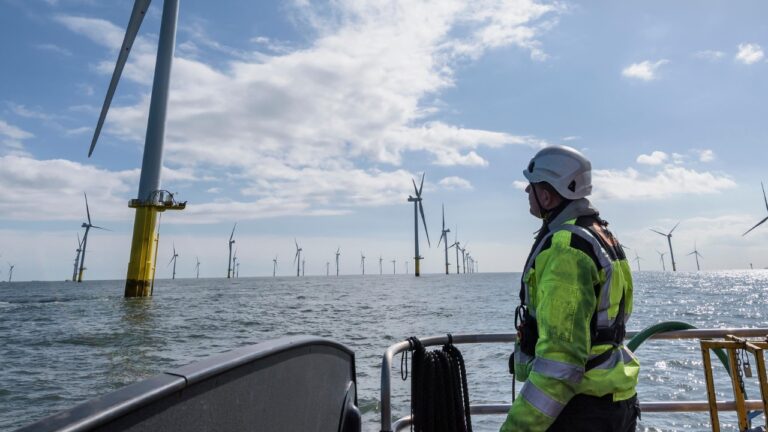
Benedict McAleenan
Senior Fellow, Energy and Environment (2019-2023)
This week the Government announced that it is considering taxing imports from countries that don’t match the UK’s carbon emissions standards – a measure known as a Carbon Border Adjustment Mechanism (CBAM). That would be a major change to customs and trade policy, and suggests a fundamental shift in the UK’s strategy for addressing climate change.
It was released in a written statement to the House of Commons by the Financial Secretary to the Treasury, which is rather an understated way to announce such a major policy, especially as the Trade Secretary also gave a speech on green trade this week that didn’t mention the CBAM proposal at all. That understated approach might be a sign of the political times, with many questioning the Net Zero agenda, but equally suggests that the UK is not just sticking to Net Zero but doubling down.
Offshoring emissions
Since 2018, Policy Exchange has called for a CBAM, setting out the case in our paper on The Future of Carbon Pricing, which received cross-party support at the time. However the case has long been made by much earlier advocates, who have identified this key weakness in climate policy for over a decade now, such as Sir Dieter Helm of Oxford University. In the USA, CBAMs are championed by the bipartisan Climate Leadership Council, an early supporter of which was Janet Yellen, now Treasury Secretary.
A CBAM may sound rather technical, but it’s a simple concept: it is a tax placed on imports that didn’t meet the same carbon standards of goods produced here in the UK. It is designed to stop something called ‘carbon leakage’, which means effectively offshoring the UK’s carbon emissions to places like China or India. The UK has a ‘carbon price’, which effectively involves taxing carbon emissions in certain sectors (mainly electricity and domestic aviation). Arguably it makes the UK less competitive, but environmentally cleaner. But nothing is stopping companies from moving overseas or outsourcing production to places with lower environmental regulations, then importing back to Britain. In this scenario, the UK loses its productive industries, its balance of payments and climate change continues unabated. As a net importer (we consume more goods than we produce), it is nice that we’ve made great progress in cutting domestic emissions, but the effect is minimal. We can have all the wind power we like, but if most of our goods were produced by burning coal in China, then it makes little difference – our actual carbon footprint keeps going up. We need to address the emissions profile of our consumption, not just production.
CBAM solution
The European Union is proposing to introduce a CBAM and the USA has flirted with the idea, albeit remaining ambiguous on the topic. When the EU regulates, large parts of the world comply. A good example is the data standards of GDPR, which has a footprint far beyond the bloc itself, including in post-Brexit Britain. It is part of the grand strategy of the EU to be the regulator of the world, and it does so very effectively. The same would likely happen with a European CBAM, creating a domino effect of countries adopting carbon pricing policies. In Australian politics, for example, the EU’s plans for a CBAM are often brought up as a reason to introduce carbon pricing either explicitly through a tax or implicitly via regulations. If you achieve ‘carbon equivalence’ with the EU, you’ll be able to trade with it freely. If not, you’ll have to pay a CBAM tariff.
This is good for the climate agenda. Although it’s no silver bullet, an international carbon price would make a huge difference in addressing climate change. But no one thinks that a grand carbon pricing treaty is on the horizon. So unilateral (UK) or plurilateral (EU) action is much more realistic.
It also makes for good domestic politics. It is arguably progressive, it’s market-led (it can render redundant many regulatory interventions) and it helps to push back against the offshoring of production, thus supporting jobs. However, it’s still a tax. The question will be how to redistribute the revenues from a CBAM. You could use it to reduce VAT, which would support lower-carbon consumption and address some of the distortive effects of the CBAM. You could create a direct ‘carbon dividend’ to be paid to everyone, which Policy Exchange argued for in 2018 as a way to gain political support. Or you could reinvest the revenues into renewables or energy efficiency, which would cut energy bills and domestic emissions at the same time.
Critics argue that such a tax will impact international trade, and that is bad for consumer prices, trade relations, innovation and many other things. That need not be the case. A well-designed policy that develops incrementally could be economically (and fiscally) neutral. Yes, it increases the state’s role in trade, which is anathema to some, but this makes sense in terms of the state’s role in addressing market failures and harmful externalities such as climate change.
Indeed, we increasingly seek to price externalities through regulation in global supply chains:
- We expect food standards to be met and we’re prepared to pay for that (this isn’t technically an externality, but most people agree that society as a whole has a strong interest in safe food).
- We’ve legislated against Modern Slavery in the supply chain, deeming it unacceptable to buy blood-soaked goods.
- More recently, society has made it clear that companies should not be operating in Russia if they want to do business with UK consumers. McDonald’s warned its shareholders of a $1bn hit from its exit from Russia, and oil firms have similarly lost billions in the rush for the door. This is a form of significantly raising the price of doing business with war criminals.
- Janet Yellen has advanced the concept of ‘friend-shoring’, meaning the relocation of supply chains to countries that share American values. This will come with costs – politically chosen supply chains are often not as economically efficient, even if they are morally preferable.
All of the above comes with an implicit price – arguably CBAMs are more explicit and therefore easier for firms to work with than all of the above.
The exact design of a British CBAM remains to be decided: which types of goods the CBAM applies to, how much to tax, how to apply it to goods of various origins, what to do with the funds, how to square this with the WTO and our most important trade partners. But the principle of addressing carbon leakage is sound.


